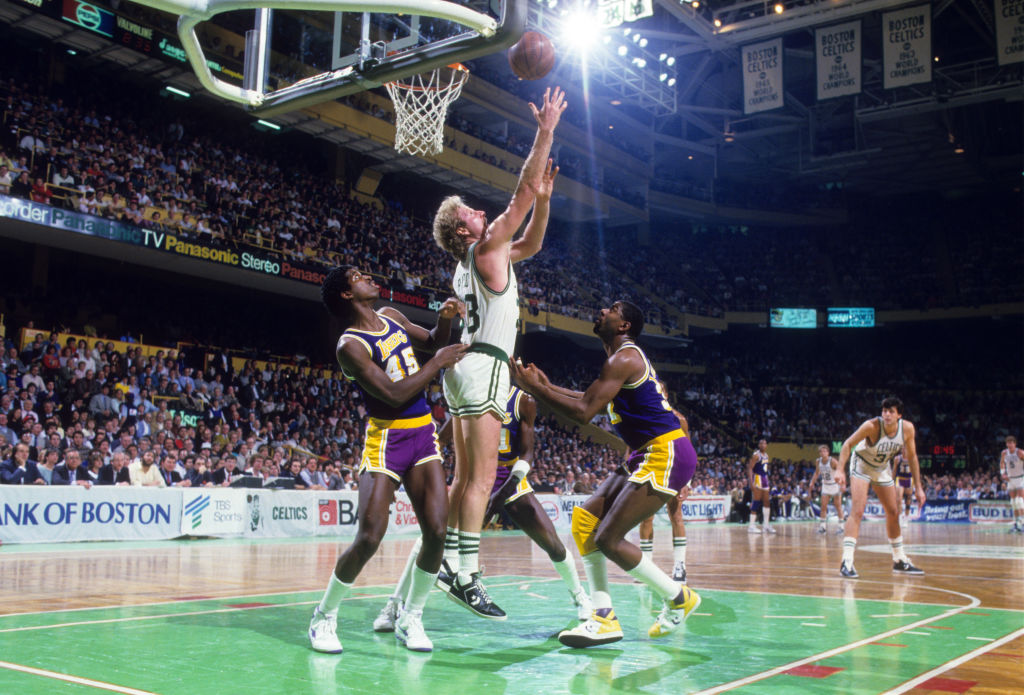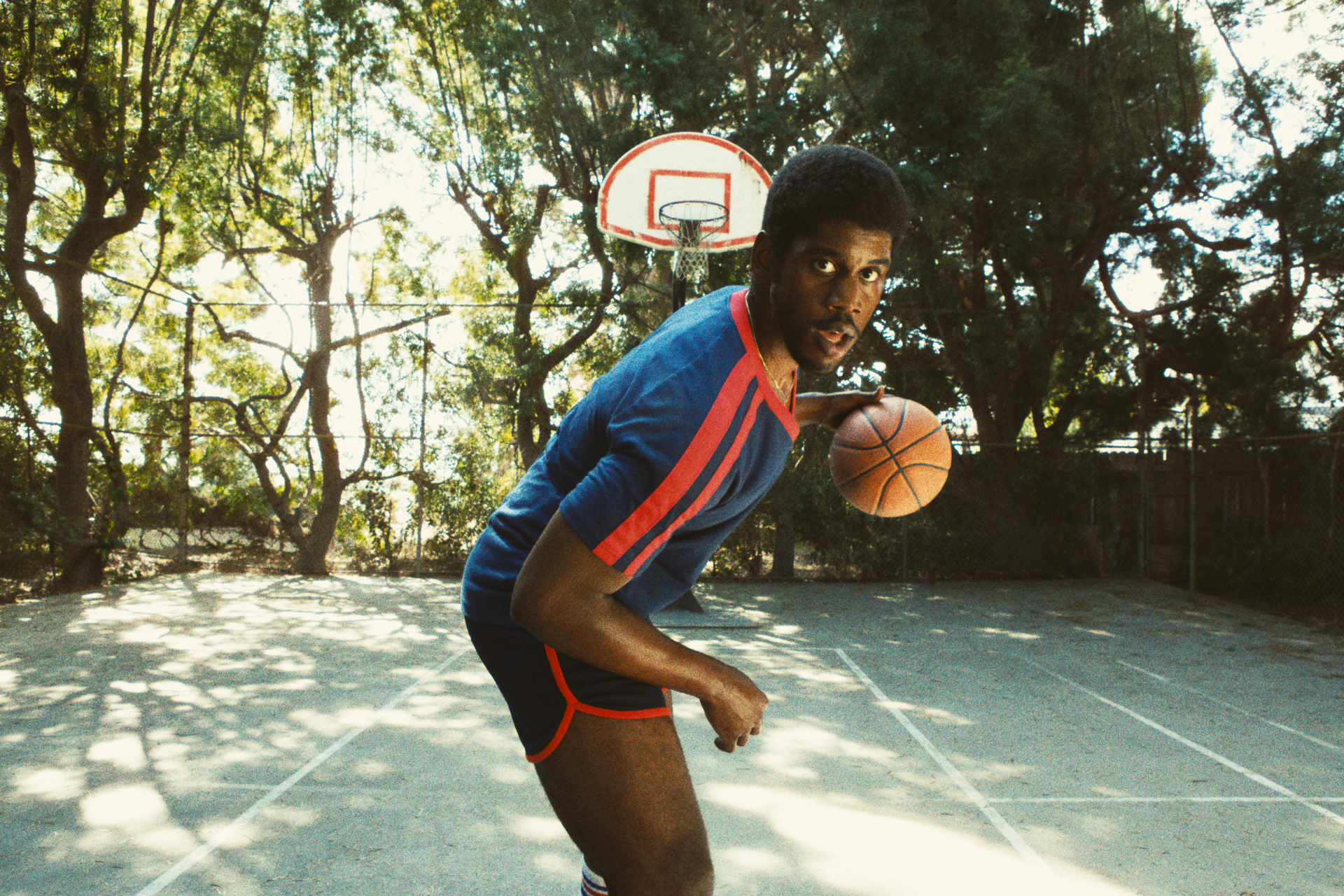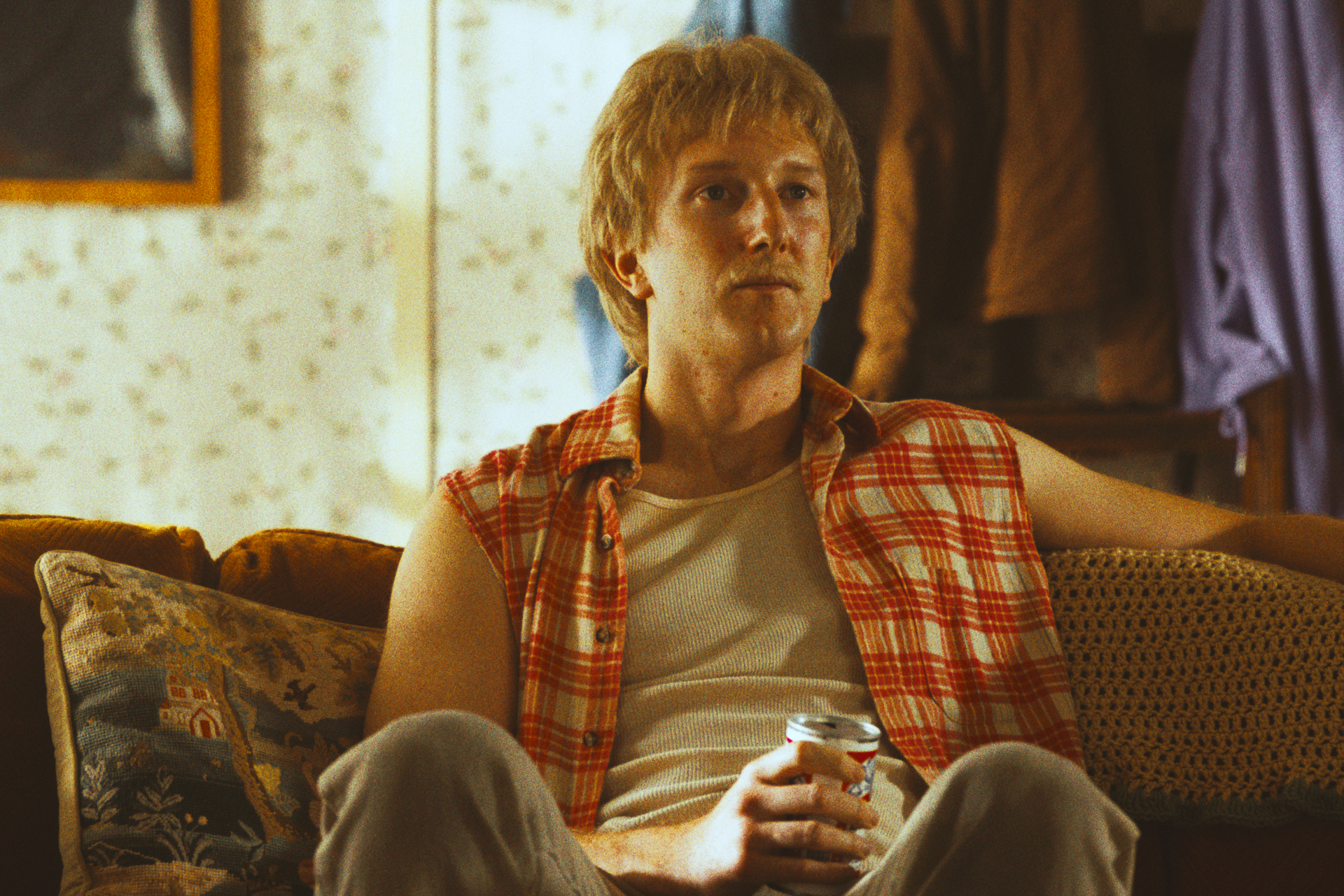
It’s the Los Angeles Lakers vs. the Boston Celtics in Season 2 of Winning Time: The Rise of the Lakers Dynasty. When the HBO docudrama inspired by Jeff Pearlman’s 2014 best-seller Showtime: Magic, Kareem, Riley, and the Los Angeles Lakers Dynasty of the 1980s returns on Aug. 6, it puts the spotlight on one of the greatest rivalries in professional sports.
While the first season of Winning Time covers the Lakers’ stranger-than-fiction run to championship glory in 1980, the seven new episodes find drama in how hard it is to keep on winning. Season 2 traces L.A.’s bumpy road to the 1984 NBA Finals, which was the first time the Showtime Lakers played the Celtics for the League’s highest honor. The two franchises had been battling on the court—and sometimes off—since the 1950s, a decade before the Lakers would relocate from the frigid temperatures of Minneapolis to bright lights of Hollywood. But the bad blood between the squads hit its boiling point in the 1980s thanks to two generational superstars whose rivalry predated their NBA debuts: L.A.’s charismatic baller with a megawatt smile Earvin “Magic” Johnson (played by Quincy Isaiah) and Boston’s working class hero Larry Bird (Sean Patrick Small).
Below, the history behind the 64 years-and-counting rivalry at the center of Winning Time Season 2. (Note: while this story is based on history as opposed to the series' new episodes, viewers hoping not to be spoiled should proceed with caution.)
When did the rivalry between the Lakers and the Celtics begin?
The Boston Celtics and the then Minneapolis Lakers met for the first time in the 1959 NBA Finals. The Minneapolis Lakers, who moved to California in 1960, were basketball’s first dynasty, winning championships in 1949, 1950, 1952, 1953, and 1954. However, the Bill Russell-led Celtics proved too good for a Laker team that featured future Hall of Famer Elgin Baylor.
The Celtics beat the Lakers 4-0, the first sweep in the history of the NBA Finals. It was the Celtics’ second Finals victory and the first Finals loss for the Lakers. The Celtics would go on to win 10 out of the NBA’s next 12 championships, winning the trophy every year in the 1960s except for 1967 when the Philadelphia 76ers beat the San Francisco Warriors. The Red Auerbach-coached Celtics won an unprecedented eight championships in a row from 1959 to 1966, which is still the longest consecutive title run in U.S. professional sports. Boston’s reign is considered one of the greatest dynasties in not just NBA history, but sports history.
The Lakers were the runner-up to the Celtics in six of Boston’s 10 championship wins. The most notable loss came in 1969, when L.A.’s owner Jack Kent Cooke was so confident his squad would win Game 7 at home that he had flyers put on every seat at The Forum stating: “When, not if, the Lakers win the title, balloons will be released from the rafters, the USC marching band will play ‘Happy Days Are Here Again’ and broadcaster Chick Hearn will interview [Lakers stars] Elgin Baylor, Jerry West, and Wilt Chamberlain in that order.” Unfortunately, those flyers made their way to the Celtics locker room. Before tip-off, Russell let Laker legend Jerry West know that those balloons would be staying in those rafters.
Russell was right; the Lakers lost 108-106, but West was sensational, going for 42 points, 13 rebounds, and 12 assists. He was so good that he was voted Finals MVP, becoming the first person to ever win the coveted award and the only player to ever win that award for a losing team, a “dubious” honor that the inspiration for the NBA’s logo isn’t exactly thrilled about. He told In Depth with Graham Bensinger in 2019 that he remembered thinking at the time “just how stupid it was that I would receive that [award when] I wasn’t part of the winning team. It didn’t seem right. It was meaningless for me regardless of how I played.”
With that loss, the Lakers would go the entire decade of the ’60s without a championship. (The ’69 Finals also marked the end of Russell’s friendship with longtime rival Wilt Chamberlain.) However, it wasn’t long before the Lakers would be world champions again, winning the trophy in 1972 over the New York Knicks, and achieving back-to-back wins against the 76ers in 1980 and 1982. It wasn’t until 1984 that the Lakers got another shot at the Celtics.
How did Magic Johnson and Larry Bird reignite the Celtics-Lakers rivalry?
By the end of the 1970s, the Celtics had won 12 NBA championships; the Lakers had six. Some questioned whether the rivalry between the two teams was officially dead—until the 1980s, when Johnson and Bird added some youthful energy to a languishing feud.
The two had been college basketball rivals. Johnson’s Michigan State faced Bird’s Indiana State University in the championship game of the 1979 NCAA Tournament. Michigan would win 75-64 with Johnson being named the Most Outstanding Player of the Final Four. The Bird-Johnson match-up was the most-watched college basketball game in NCAA finals history. When Johnson and Bird went pro later that same year, their rivalry followed them, as did the fans. The two men couldn’t be more different in their on- and off-court style, but their rivalry, now considered to be one of the greatest in sports, helped the NBA find its audience at a time when it was struggling to bring in revenue. “If Magic Johnson and Larry Bird did not save the NBA,” Sports Illustrated writer Jack McCallum wrote in 1992, “they most certainly performed CPR on it.”
Bird and Johnson became friends in 1987 after filming a legendary Converse commercial that poked fun at their rivalry, but the ongoing contest between them wasn’t just for the cameras. “The first thing I would do every morning during the season was look at the box scores to see what Magic did,” Bird told Sports Illustrated in 2019. “I didn’t care about anything else.” During an appearance on the Dan Patrick Show in 2023, Johnson admitted, “In the beginning, we hated each other. I had to hate him because they beat us.”
What happened when Magic Johnson and Larry Bird met in the 1984 NBA Finals?

The two future Hall of Famers made their presence known in the NBA almost immediately. Johnson won his first championship ring in 1980 against the 76ers, becoming the first player to win Finals MVP in their rookie season. Bird, who beat Johnson for the 1980 Rookie of the Year, won his first ring the following year against the Houston Rockets, only to watch Johnson take home his second ring and second Finals MVP trophy in 1982.
Despite all the hardware Magic and Bird were racking up, their long awaited first matchup in the Finals didn’t come until 1984—and it didn’t disappoint. The grueling seven game series had everything: a 30-point Game 3 blowout that led Bird to call his teammates “sissies,” the Lakers needing oxygen masks to get through Game 5 in the un-air conditioned Boston Garden, and the infamous clotheslining incident in Game 4 that inevitably decided the winner of the series.
With the Lakers up 2-1 in the series, Celtics power forward Kevin McHale brought his Lakers counterpart Kurt Rambis down with a move that was straight out of the WWE. “I thought that was a cheap shot and something you don’t do,” Rambis said in the 2017 documentary Celtics/Lakers: Best of Enemies. McHale admitted that he might have gone too far with the bench-clearing move. “I mean, I didn’t really care about hurting him that much,” he said in the doc. “But I was like, ‘Oh, that might have been a little bit more than I anticipated.’”
McHale’s bully tactic seemed to give the Celtics the momentum they needed to come back and win Game 4 and eventually the series. In 1984, Bird won the first of his two Finals MVP trophies that year, but, more importantly, it meant that the Celtics were 8-0 in their Finals matchups against the Lakers.
What happened after the Celtics won the 1984 Finals?
The Celtics and the Lakers were at it again in the 1985 Finals, but this time, L.A. was able to take down their East Coast rivals in six games. Their Game 6 victory at Boston Garden made them the only visiting team to ever win an NBA championship in that arena before it closed its doors in 1995.
In 1986, the Lakers lost in the Western Conference Finals to the Houston Rockets, who went on to lose to the Boston Celtics. That year, Bird’s team not only won the title, he won his third consecutive MVP trophy and his second Finals MVP trophy.
The next year, the Lakers and Celtics were back in the Finals. L.A. took home the 1987 trophy and then again the following year when they defeated the Detroit Pistons. Winning four rings in eight Finals outings in the ’80s solidified them as the newest NBA dynasty.
After losing in 1987, the Celtics wouldn’t return to the Finals for another 21 years. When they finally did get back there in 2008, they competed against, who else, the Lakers.
What is the state of the Lakers-Celtics rivalry today?

The rivalry between the two teams all but disappeared after Bird and Johnson retired in the ’90s.
(Bird left the NBA in 1992 due to chronic back problems; Johnson left the game in 1991 following his diagnosis with HIV, but briefly returned to the Lakers in 1996 before retiring for good that same year.) Michael Jordan and the Bulls were unstoppable in the ’90s, but the Lakers saw success in the early 2000s with the dynamic duo of Kobe Bryant and Shaquille O’Neal, who won three consecutive titles in 2000, 2001, and 2002. (The Lakers’ 2000 win came against the Indiana Pacers, whose coach was Bird.)
In 2008, the Celtics’ “Big Three”—Kevin Garnett, Paul Pierce, and Ray Allen—took on Bryant’s Lakers and won. Two years later, Bryant got his revenge, beating the Celtics in seven games to win his fifth and final ring. The Celtics and Lakers haven’t met in the Finals since, with each team managing to return to the Finals only once in the past 13 years. The Celtics lost to the Golden State Warriors last year, while the Lakers won their 17th championship in 2020.
That number is significant. With 17 wins each, the Lakers and the Celtics are the NBA franchises with the most championship wins. Celtics fans have argued that their team should be the sole record holders since the Los Angeles Lakers have only won 12 championships while the Minnesota Lakers won the other five. Unfortunately, the record books don’t agree with Celtics Nation’s clever accounting, so whichever franchise wins a title next will make history. In a perfect world, the Lakers and Celtics will have to duke it out for the record. Preferably with former rivals Johnson and Bird sitting courtside, rooting their former teams on.
More Must-Reads From TIME
- The 100 Most Influential People of 2024
- Coco Gauff Is Playing for Herself Now
- Scenes From Pro-Palestinian Encampments Across U.S. Universities
- 6 Compliments That Land Every Time
- If You're Dating Right Now , You're Brave: Column
- The AI That Could Heal a Divided Internet
- Fallout Is a Brilliant Model for the Future of Video Game Adaptations
- Want Weekly Recs on What to Watch, Read, and More? Sign Up for Worth Your Time
Contact us at letters@time.com